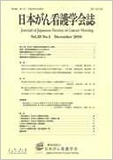Japanese
English
- 販売していません
- Abstract 文献概要
- 参考文献 Reference
- サイト内被引用 Cited by
要旨
本研究の目的は,転移のある高齢がん患者の治療に対する納得の要素を明らかにすることである.本研究では,納得とは「高齢がん患者が治療に対して,能動的に認知的かつ感情的に受容した状態」と定義する.研究方法は質的記述的研究デザインで、がんに対して治療を選択した現在治療過程にある65歳以上の転移のある高齢がん患者20名を対象に半構造化面接法を実施した.結果,転移のある高齢がん患者の治療に対する納得の要素として,【自分を救おうとする強い意志】【生きるための治療であるとの確信】【治療の可能性への期待】【信じて任せられる最善の治療であるとの判断】【周りへ報いたいとの希求】【治療を含めて生ききる人生の受け容れ】の6つのカテゴリーが抽出された.
これらの転移のある高齢がん患者の治療に対する納得の要素の特徴として,1つは患者自身の価値が治療状況に反映していることが示唆された.2つ目として,自己の利害にとらわれずに周りの人達の気持ちを察し,それを自分の気持ちや意志として汲み取る特徴が推察できた.3つ目として,治療だけでなく,自分の人生に対するあり方や生き方も含めた今の状況に対する受け容れでもある特徴が示唆された.それは,病期が進んだ状況でのライフサイクル最終段階にある高齢者のもつ特徴が表れていた.また,これらの要素は転移のある高齢がん患者が生きてきた中で培われたものでもあり,その人の生き様や今の状況に患者がコミットできるように支援することも納得に導いていく看護となることが示唆された.
The objective of this study was to identify elements of how older patients with metastatic cancer become “nattoku” with treatment. In this study, nattoku was defined as “a state of cognitive and emotional acceptance of treatment” by older cancer patients. A qualitative descriptive study was employed, and semi-structured interviews were carried out with 20 metastatic cancer patients aged 65 years or older who were currently undergoing cancer treatment on their own volition. We extracted six elements that involve becoming nattoku with treatment: a strong intention to save oneself, certainty that the treatment was required in order to live, expectations of the potential of treatment, trusting that they chose the optimum treatment, the desire to give something back to those around them, and accepting to live life to the fullest, even while undergoing treatment. Our results suggested that the values of patients themselves were affected by their treatment status. Also, patients were not solely concerned with their own interests, but sensed the feelings of those around them and took them into consideration. A third characteristic suggested by our findings was their acceptance of treatment, and their attitude towards life and the way in which they have lived. This was characteristic of older patients with advanced illness who were in the final stage of life. These elements were fostered during the lives of older patients with metastatic cancer, and our study suggested that support that encourages patients to commit to a lifestyle and their current circumstances may help them become nattoku with treatment.
Copyright © 2016, Japanese Society of Cancer Nursing All rights reserved.


